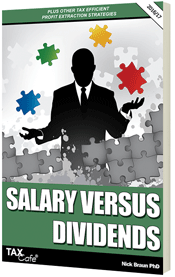IR35: Personal Service Companies
Could Your Company be Classed as a 'Personal Service Company'?
IF YOUR company is classed as a personal service company, many of the tax planning opportunities available to other company owners may not be available, for example, the ability to take dividends that are free from national insurance.
The latest information can be found in our guide:
Salary versus Dividends
Personal service companies have to operate the infamous ‘IR 35’ regime which means the company may be forced to calculate a notional salary for the director/shareholder. This deemed income will be subject to PAYE and national insurance.
Essentially, HMRC may ignore the company set up and treat most of the company’s income as employment income.
Which Companies Are Affected?
This is where it all becomes a bit of a grey area (which is why professional advice is essential!)
A personal service company is, generally speaking, a firm that receives all or most of its income from services provided by the director/shareholder.
Often the work will be carried out for just one client, often for a long period of time, and the client will probably only want the personal services of the company owner themself (hence IR35 often applies to ‘one man band’ companies).
Essentially HMRC is looking for cases of ‘disguised employment’. In other words, ignoring the fact that there is an intermediary company, the relationship is more like an employer/employee relationship rather than the kind of relationship that exists between independent self-employed business owners and their clients. Where such ‘disguised employment’ exists, the company must apply the IR35 regime to the payments received from that client – effectively treating most of those payments as if they were salary paid to the director/shareholder.
A typical situation which might be caught under the IR35 rules is where the individual resigns as an employee and then goes back to the same job but working through a company.
However, it’s all very subjective with a long line of legal cases adding to the confusion.
Personal service companies can be found in many different business sectors: the most cited example is IT consultants. They also came under the media spotlight recently when it was disclosed that some BBC presenters have been operating as ‘freelancers’ via personal service companies, when many would argue that they are in fact nothing but employees of the BBC.
Business Entity Tests
In May 2012, HMRC published a set of ‘business entity tests’ that are being piloted to help companies assess whether they should be applying the IR35 rules.
Essentially the tests attempt to distinguish between companies that are truly independent businesses and those that are simply employment in another guise.
There are 12 tests with different points attached to each. By totting up the total points, you can assess which risk band you fall into:
Less than 10 points - High risk
10 to 20 points - Medium risk
More than 20 points - Low risk
If HMRC checks whether IR35 applies to you, and you can prove that you are in the low risk band, they will generally close their IR35 review.
The tests are as follows:
1. Business Premises Test. Does your business own or rent business premises which are separate both from your home and from the end client’s premises? Score 10 points if the answer is yes.
2. PII Test. Do you need professional indemnity insurance? Score 2 points if the answer is yes.
3. Efficiency Test. Has your business had the opportunity in the last 24 months to increase its income by working more efficiently (e.g. contract clauses that pay you a fixed amount for a job even if you finish early)? Score 10 points if the answer is yes.
4. Assistance Test. Does your business engage any workers (other than the directors/shareholders) who bring in at least 25% of the yearly turnover? Score 35 points if the answer is yes.
5. Advertising Test. Has your business spent over £1,200 on advertising in the last 12 months? Score 2 points if the answer is yes.
6. Previous PAYE Test. Has the current client engaged you on PAYE employment terms within the 12 months which ended on the last 31 March, with no major changes to your working arrangements? Score minus 15 points if answer is yes.
7. Business Plan Test. Does your business have a business plan with a cash flow forecast which you update regularly? Does your business have a business bank account, identified as such by the bank, which is separate from your personal account? Score 1 point if your answer to both questions is yes.
8. Repair at Own Expense. Would your business have to bear the cost of having to put right any mistakes? Score 4 points if your answer is yes.
9. Client Risk Test. Has your business been unable to recover payment:
- For work done in the last 24 months
- More than 10% of yearly turnover?
Score 10 points if your answer is yes.
10. Billing Test. Do you invoice for work carried out before being paid and negotiate payment terms? Score 2 points if your answer is yes.
11. Right of Substitution Test. Does your business have the right to send a substitute? Score 2 points if your answer is yes.
12. Actual Substitution Test. Have you hired anyone in the last 24 months to do the work you have taken on? Score 20 points if the answer is yes.
These tests may provide a useful guide and indicate whether HMRC might want to investigate your tax affairs.
However, they are purely guidance and not based on law. The actual application of IR35 will always boil down to individual engagements and each contract must be looked at separately.
Ultimately, professional advice will still be required to determine whether you are subject to IR35 or not.






